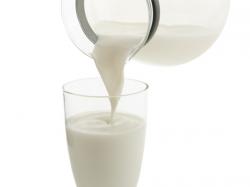New Study: Organic & Long-Life Milk A 'Risk To Children's IQ'
April 28, 2015 | 3 min to read

Pregnant or breastfeeding women could be putting the health of their babies at risk by switching to organic or long-life UHT milk, new research suggests.
University of Reading scientists found that milk certified as ‘organic', as well as conventional long-life milk treated at ultra-high temperatures (UHT), was a third lower in iodine than conventionally-produced fresh milk.
Researchers from Reading's Food Production and Quality Division said the findings had potentially serious public health implications, as most iodine in our diet comes from milk products.
Iodine is particularly crucial for the brain development of babies, particularly in the early stages of pregnancy. Studies have found that iodine deficiency in mothers during these stages can lead to children with a lower IQ.
Iodine deficiency was once endemic in parts of the UK, with hundreds of thousands of people in the 1930s and 1940s suffering from goitre – an enlargement of the thyroid caused by a lack of iodine, which can lead to swollen glands and other health problems.
While some countries launched campaigns to add iodine to bread or salt, Britain solved its problem by accident with the enrichment of iodine in milk from supplements given to dairy cows.
As post-war consumption of conventionally-produced milk increased, iodine deficiency was all but wiped out by the 1990s – described by experts as an ‘accidental public health triumph'.
However, doctors warned 20 years ago that this ‘haphazard' approach could be risky because it could be influenced by changing trends in the production or consumption of milk.
‘Serious implications'
Professor Ian Givens, University of Reading, who led the research, said: "People are increasingly buying organic and UHT milk for perceived health benefits or convenience. But our research shows that this trend could have serious implications for public health.
"Iodine deficiency ought to be a health problem from the past. But unless this situation is carefully monitored, we risk sleepwalking into a new health crisis in the 21st century.
"Organic and UHT milk is not bad for you, and drinking all types of milk has numerous health benefits. But to get the same amount of iodine as in a pint of conventional pasteurised milk, you would need to drink around an extra half-pint of organic or UHT milk."
A previous study has shown that some organic milk, produced in summer when organic dairy herds are fed almost exclusively on grass, was lower in iodine. This latest study shows that the trend is year-round, as well as making an assessment of iodine content in UHT milk for the first time.
The study is published online in the journal Food Chemistry.
The UK Department of Health advises that eating a balanced diet should provide your body's daily requirements for iodine. But previous research has shown that up to 70% of teenage girls across the UK are now iodine deficient, with a decline in milk consumption thought to be the most likely cause.
Source: University of Reading
